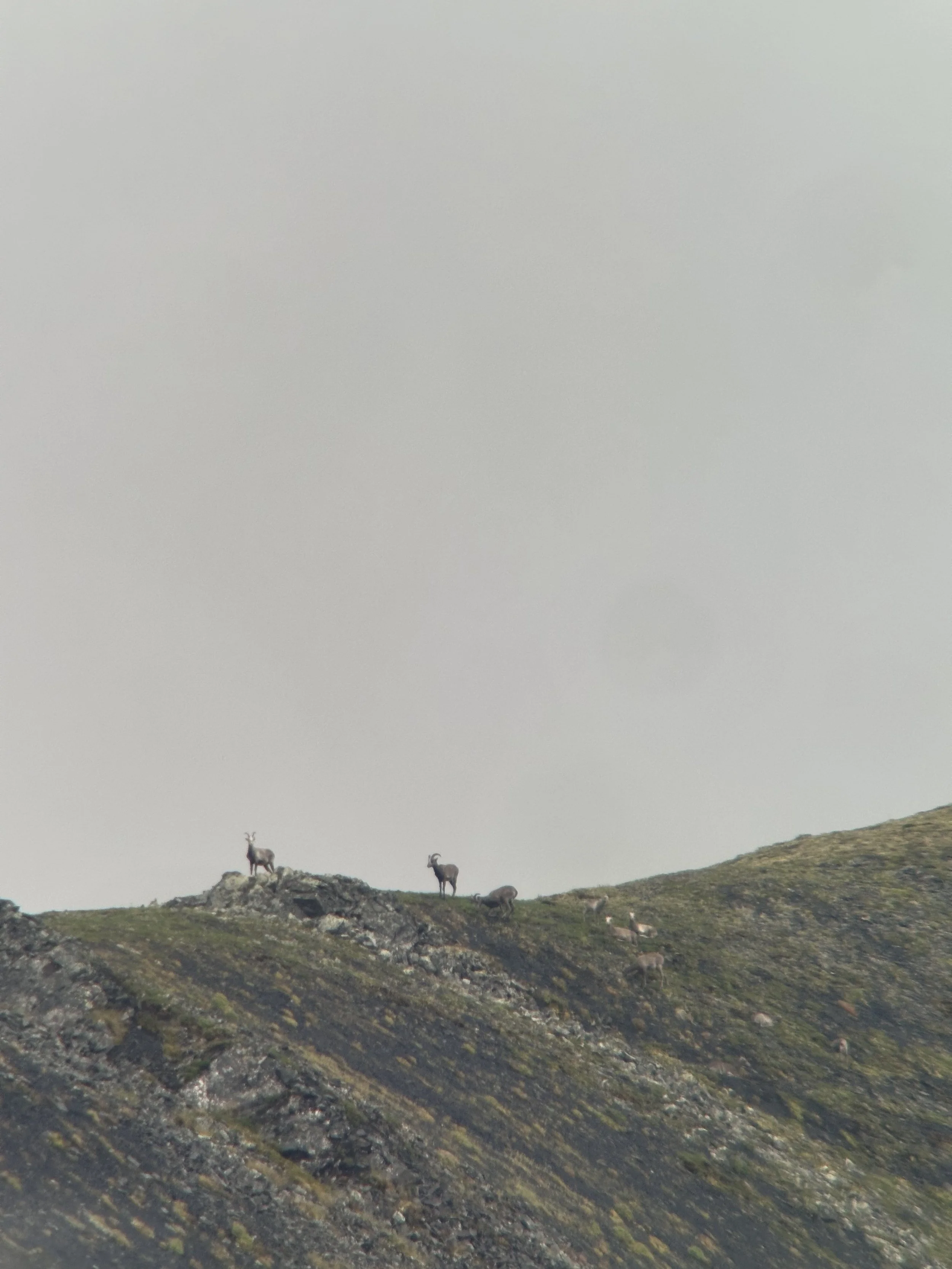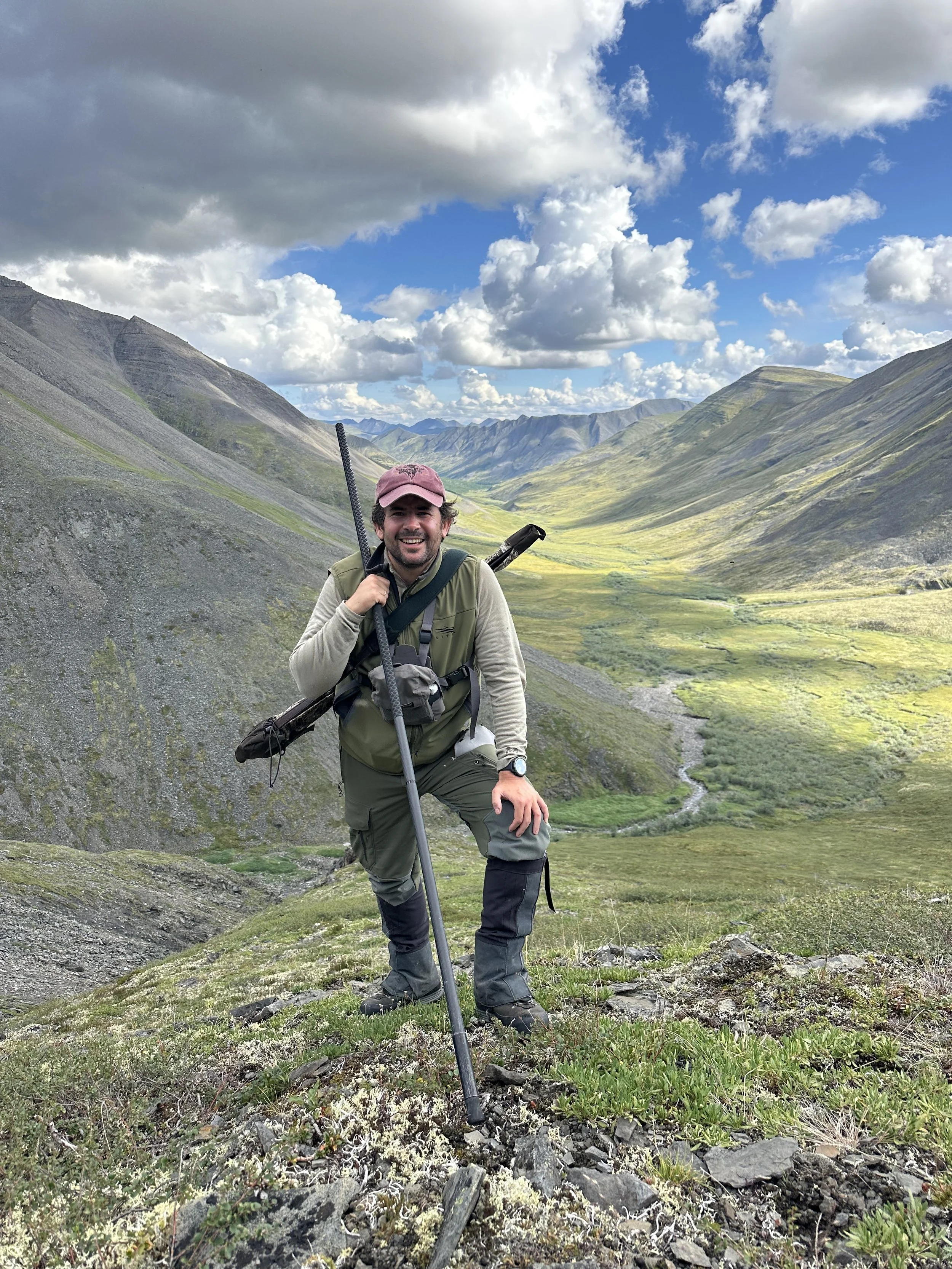Yakutia Snow Sheep - Where Distance Still Means Something
Snow Sheep hunting in one of the last truly wild places on Earth.
There are hunting trips that test your patience. Others test your legs. And then there is Yakutia — where both are only the beginning.
The journey to Yakutia starts long before the first step into the mountains. Between connecting flights, rifle paperwork, and endless hours across Russia, the road to the far east feels more like an expedition than a trip. Yet every delay, every checkpoint, and every extra hour of waiting is part of what makes this adventure what it is: a slow transition from the civilized world into pure wilderness.
Arrival in Yakutsk
After nearly three full days on the move, the sight of Yakutsk under the wing feels like an arrival in itself. The flight descends through heavy clouds, and the city appears — grey, wet, half-hidden — built entirely on the frozen ground that gives it both life and limitation.
We landed that morning, convinced the long journey was finally over. It wasn’t. From here to our base camp still lay four full days of travel: another domestic flight, hundreds of kilometres by river, and long stretches of tundra to be crossed on quads and horseback. In Yakutia, close is a relative term.
The city greeted us with partially flooded streets — July had brought relentless rain — and a curious mix of worn Soviet buildings and unexpected signs of modern life. After checking into our small hotel, we set out to explore. The Permafrost Cave, a corridor of eternal ice, felt like stepping into another planet; the Treasury Museum dazzled with its display of gold and diamonds, a reminder that beneath this land of cold lies one of the richest soils on Earth.
That evening, our local partner welcomed us with a formal dinner in one of Yakutsk’s most refined restaurants. The contrast with the city outside was striking. The menu offered a daring sequence of local dishes: frozen fish, caribou liver, horse tartare, even blood wrapped in tripe. Some tested our limits; others, like the cheesecake with wild blueberry ice cream, were simply exceptional.












Upstream into the Wild
The next afternoon we boarded a small twin-engine turboprop bound for Batagai-Alyta, two hours north of Yakutsk. The flight crossed an ocean of forest and tundra — endless green broken only by the silver threads of rivers below. When the wheels finally touched the gravel airstrip, it felt as if we had landed at the edge of the inhabited world.
Batagai-Alyta is little more than a cluster of wooden and metal houses, a handful of shops, and a population that survives where winter reaches –60 °C. It is hard to imagine anyone living here once the summer ends. We spent the night in the only guesthouse in town — a tired, creaking building with no real bathroom, but warm enough and, thankfully, just for one night.
Next day early morning, the real journey began. With 240 kilometres of river ahead, we loaded our gear into long rubber boats and set off upstream. The river was wide and fast, framed by walls of spruce and birch. For the next twelve hours, the world reduced itself to the rhythm of engines, the hiss of water against the hull, and the occasional stop to refuel in complete silence. It was both hypnotic and humbling — an unbroken corridor of wilderness where no road has ever reached.
As the evening light turned golden, we finally saw smoke rising from the bank: our first base camp. The guides were waiting for us with a welcome that felt almost ceremonial — a small fire burning, bread and tea offered as gifts, and a few words of thanks to the river and the mountains for keeping us safe.
Dinner was simple but comforting: hot soup, pasta, clear spring water, and endless cups of tea. Inside our wooden cabin, a small iron stove filled the room with warmth and the quiet crackle of fire.
It had been five days since leaving Madrid, and the sense of distance was overwhelming. Yet, as we lay in our bunks that night, listening to the river outside, one thought kept coming back: tomorrow we would begin the final push toward the mountains — and to the sheep that had brought us all this way.
Final Stage
We slept that night better than we had in days, the kind of deep rest that comes only after exhaustion. By the time the first light crept into camp, we were awake, feeling restored and almost human again. Our cook — affectionately nicknamed “Mami” for the way she looked after us — already had breakfast waiting: strong coffee, warm porridge with honey, and the kind of quiet care that makes you feel at home, even at the edge of the world.
Once the guides had checked the route and loaded the gear, we climbed onto the massive quads that would take us further into the mountains. These were huge and so much fun to ride! The day ahead would be long, a full day’s ride across endless valleys and rivers.
We crossed waterways so deep that the engines vanished under curtains of spray, and each time we reached the opposite bank, we laughed — partly in relief, partly in disbelief at where we were. The air smelled of wet moss and fuel, of birch and cold stone. The landscape was infinite.
Midway through the day, the guides stopped unexpectedly. One of them dismounted, removed his gloves, and spoke softly in his native Yakut language. “This is where our great-grandmother rests,” he said. “You must meet her before you hunt.” We followed his lead, kneeling on the tundra as he cut small pieces of bread and poured a few drops of vodka into the moss — an offering to the spirits who, in their belief, decide whether a hunter is welcomed or not. It seemed to be a very personal way of asking her permission to hunt on her mountains.
The hours passed, the miles blurred, and fatigue mixed with wonder. Despite the endless jolts of the quads, part of us didn’t want it to end. Beauty, when it’s this raw, keeps you awake.
By late evening, after six full days since leaving Madrid, the camp appeared like a mirage between the mountains — a small world built with care in the middle of nowhere. Each of our tents stood tall and spacious, canvas stretched tight against the wind, each fitted with its own wood-burning stove that filled the air with the smell of pine smoke. Inside, proper beds, thick mattresses, and enough room to stand and move around — more comfort than anyone could hope for in a place like this.
The welcome was extraordinary. The team who had spent the last two weeks scouting rams greeted us with smiles and tea already steaming in tin mugs. There was laughter, a few handshakes, and the quiet pride of men who live and breathe these mountains.
That night, under the soft glow of the stove, the air heavy with smoke and anticipation, one thought echoed in everyone’s mind: tomorrow the hunt would finally begin.







Opening Day
We woke up late that morning, unhurried and well-rested for the first time in days. Outside, a grey sky hung low over the mountains, and the rain seemed evident. Over tea, the guides discussed the plan: they would leave camp ahead of us to check a few groups of rams they had been watching during the past days. If they found a good one, they would call us on the radio.
Around 11:30 a.m., the message came through. They had located a group of four mature rams on the opposite side of the valley. We packed quickly and began the climb, following a steep ridge to gain enough altitude to reach a good vantage point above them.
The guides led us slowly, keeping the wind in our faces. When we finally reached the highest point, we could see the rams far below, resting on a long open slope. Using the terrain for cover, we moved as close as we could, crawling the last few metres until we could clearly identify them through the spotting scope. One ram stood out immediately — heavier, older, and clearly dominant.
At just over 340 meters, we set up for the shot. The wind shifted slightly across the valley, and the cold rain returned, cutting sideways through the air. When the ram finally stood, broadside and unaware, Jaime took his chance. The first bullet struck just high across the back. Without wasting any time, Jaime reloaded his single shot Blaser very quickly looking for a second opportunity. The rams had no idea what was going on, and they stood still unaware of where the danger was coming from. Luckily for us, the second shot was perfect and the Snow Sheep dropped on its tracks!
He was twelve years old — a magnificent Snow Sheep, thick-horned and heavy. Following the local tradition, we offered a small piece of the liver to Bayanay, the God of hunting, in gratitude for the chance to take such an outstanding and old ram.




Second Snow Sheep
With Jaime’s hunt successfully concluded on the very first day and so many days still ahead, it was now my turn to try for a ram — a dream that had been quietly following me for many years.
We left camp on horseback as the morning light spread slowly across the valley. The air was crisp, the tundra still wet from the night’s rain, and the only sound was the rhythmic breath of the horses. Ahead of us stretched a vast landscape of green valleys and slate-grey peaks disappearing into the horizon.
Along the river we passed the bleached antlers of moose, lying forgotten in the grass — silent reminders of how long and severe the winters are here. After a couple of hours, we spotted a few ewes high on a ridge. In Yakutia, the Snow Sheep live where the sky begins.
We tied the horses and began to climb on foot. The ground was steep and broken, the wind shifting unpredictably, and the mosquitoes constant companions. The guides pushed forward at a steady pace; I followed close behind, careful not to waste the strength I would need later. We stopped halfway to catch our breath and check the rifle before pressing on toward the upper ridge.
From the first rise we glassed a small group of young rams below us, resting. We backed out quietly and moved higher, contouring around the mountain until a new face opened up in front of us. There, on a distant slope, we finally saw what we had come for: four mature rams lying close together, one of them clearly older, heavier, and far more impressive than the rest.
The rangefinder read just under 600 meters — too far for a clean shot. The guides hesitated to approach from their side of the mountain; the wind was unstable and the climb exposed. But there was no alternative. We circled wide behind the ridge, using every fold of ground, and crawled the last stretch on our elbows until the rock ahead formed a perfect ledge.
At 217 meters, we settled into position. The rams were still bedded, unaware. Someone whispered to shoot, but I waited. In the mountains, patience is not optional — it is part of the hunt.
When the old ram finally rose to his feet, everything went quiet. He stood still unaware of our presence. I remember trying not to focus on his horns too much. He was so huge and massive, his horns seemed totally out of proportion compared with the other rams next to him. I settled behind the rifle holding my breath and asking the guides not to talk. I let the crosshairs find their rhythm with my breathing. For a moment, time held still. All I could think of was: “please don’t mess it up!” I heard my dad’s voice in my mind whispering to my ear: “just pull the trigger veeeeery slowly”, and by the time I realized, the shot went off.. The echo rolled down the valley, and the ram went down immediately, sliding a short distance before coming to rest among the rocks. What a sheep! As we walked close up to him I could not believe what I had just accomplished. He was fifteen years old — the true king of these mountains, marked by time, weather, and survival. Up close, his horns carried the weight of his years, each ring carved by another frozen winter.






We worked quietly, carefully, taking the time such an animal deserves. One of the guides went for the horses while the rest of us prepared the ram for the long way back. Later, by a cold mountain stream, we shared a simple meal of tea, pasta, and chocolate — one of those rare moments that need no words.
We rode back to camp under the long northern dusk, the light never quite leaving the sky. When I finally lay down in my tent, the stove ticking softly in the corner and the ram safe for the journey home, I knew I would never forget this day.
But That Was Not It…
The day after taking the second ram, we stayed in camp. The mountains around us stood still, washed clean by the night’s rain, and for the first time in days we had nowhere to go. We spent the morning cleaning and salting the meat, boiling the skull, and packing everything carefully for the long journey home.
There was no rush. Flights from this part of the world are rare; from Sakkyryyr, only two a week, and we had time to spare. Those hours became a luxury — drinking tea by the river, talking with the guides, and simply watching the light move across the peaks. It was a small piece of calm after one of the most genuine and remote hunts I have ever lived.
When we finally began the return, it was with that quiet satisfaction that follows something complete. The camp that had felt like the center of the world grew smaller behind us as the river carried us downstream.
Half an hour later, Yakutia decided we weren’t finished yet. A young bear appeared on the far bank, moving slowly along the gravel bars. Jaime and I looked at each other, grabbed the rifle, and slipped away together for a short stalk. The wind was perfect, the sound of the river covering every step. When we reached a small rise overlooking the bank, Jaime settled behind the scope and fired once — clean, fast, final. An unexpected ending to a hunt that already felt complete.
The next days were long and rough: cold wind, mechanical failures, endless hours on the river. Yet every mile downstream felt lighter. By the time we reached Sakkyryyr, we were exhausted, sunburned, and strangely happy. The small village was as isolated as ever — no Wi-Fi, no news, no noise. Just time. Time to rest, to think, and to let everything sink in.
Three days later, the weather finally cleared enough for the plane to come. Watching it circle above the valley and drop onto the dirt strip felt almost unreal. As we lifted off, the tundra spread out beneath us — rivers turning to silver threads, mountains fading into cloud.
Leaving Yakutia wasn’t easy. We knew that places like this leave something behind — and take something with them too.
Part of us stayed there, somewhere between the river and the mountains, where silence and distance still mean everything.
And as the clouds swallowed the last outline of that endless wilderness, I couldn’t help but think of how fortunate I am — to live this life, to share it with friends who turn journeys into memories, and to have a family that allows me to chase what once was only a dream.
For that, and for all of it, I can only be grateful.
More Than A Hunt…
Yakutia is not a destination for everyone. It’s distant, unpredictable, and often uncomfortable. But for those who seek true wilderness — places where traditions still matter and nature sets the rules — it remains one of the last real frontiers. Hunting there changes the way you see distance, silence, and time. And once you’ve been, every other mountain feels a little closer.
See You in Yakutia!
Hidden deep in the heart of Siberia lies a world few hunters will ever see — a land of silence, purity and endless horizons.
Russia remains one of the safest, most extraordinary hunting destinations on Earth, and Yakutia is its most guarded secret.
With Camino Real Hunting Consultants, even the most distant dreams become journeys that end in success.
See you soon in Yakutia — where wilderness still feels like it should.
Wishing you all a happy hunting and looking forward to meeting you soon.
Álvaro Mazón (Jr).






















